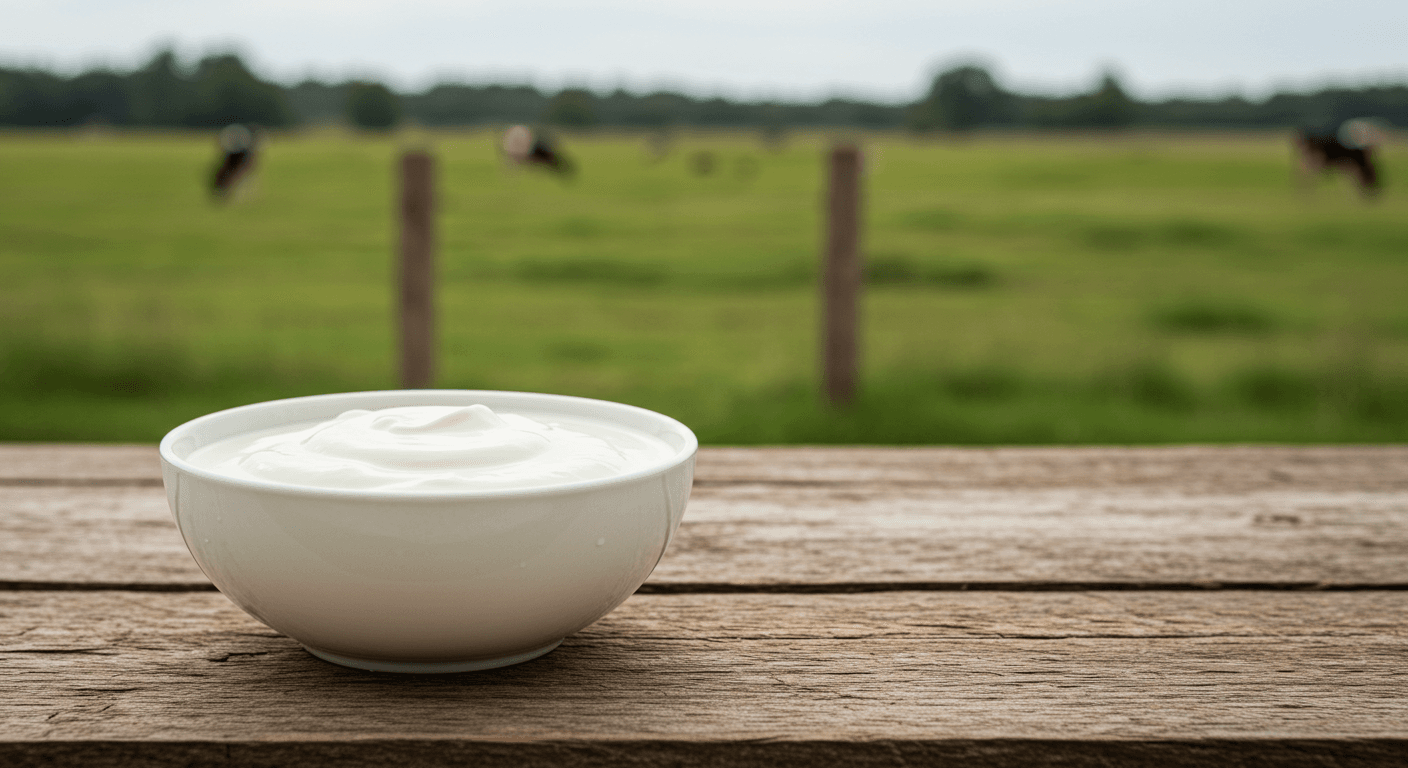Plain yogurt is a go-to snack for many of us, thanks to its creamy texture and legendary probiotics. But if you’re a dog lover, you might be scratching your head, thinking: can dogs have plain yogurt? Let’s walk through what you need to know—like why it might be good, how to serve it, and which types are best for your furry friend.
Why Plain Yogurt?

If you’re always on the lookout for new, healthy treats to share with your dog, plain yogurt is often a hot topic. You’ve probably heard about its probiotics, calcium, and protein. But before you let your pup lick the spoon, it’s worth exploring the upsides and possible downsides.
Remember, it’s not just about “Yes, dogs can have plain yogurt.” It’s also about how much, which kind, and how your dog personally handles dairy.
This is why you should feed your dogs greek yogurt!
The Upside of Yogurt
Full of Good Stuff
Plain yogurt is loaded with nutrients that can give your dog a little boost. Reach for unsweetened, unflavored yogurt (with zero artificial sweeteners) and your pup could get:
- Protein: Keeps those muscles strong.
- Calcium: Helps bones stay sturdy and supports nerve and muscle function.
- Potassium and B Vitamins: Great for energy and a healthy metabolism.
- Probiotics: Potentially helpful for balancing your dog’s gut and supporting immunity.
Wondering about Greek yogurt for dogs? It often has extra protein and less lactose, so it’s a popular pick among pet parents.
Digestive Help
Those “good bacteria” (like Lactobacillus and Bifidobacterium) found in plain yogurt can help keep a dog’s tummy on track. Some owners use dog yogurt for:
- Keeping minor diarrhea in check
- Easing mild gas or occasional belly woes
- Helping digestion bounce back after antibiotics
Sure, it’s not a magic cure-all, but it can help soothe some minor issues. If your dog’s tummy troubles are serious or nonstop, always give your vet a call.
Selecting the Right Yogurt

Not all yogurts are a sweet deal for dogs. Let’s talk about what makes one dog-friendly.
Ingredients
• Go for unsweetened, unflavored yogurt. Skip added sugars, juices, or syrups.
• Double-check for xylitol. It’s super toxic to dogs, even in tiny amounts.
• Low-fat or non-fat options can help avoid problems like pancreatitis.
• Live, active cultures (probiotics) are key if you want those digestive benefits.
Good vs. Bad Options
• Plain Greek yogurt for dogs is often a top pick because it’s strained, so it has higher protein and lower lactose.
• Regular plain yogurt is okay too, just slightly higher in lactose.
• Some folks experiment with non-dairy options (like coconut or oat yogurt) if their dogs have dairy sensitivity. But those may not pack the same protein or probiotics.
Stay away from flavors like chocolate or anything containing raisins or nuts—these can be poisonous to dogs. If you want to whip up a chilly treat, simply freeze plain yogurt. Store-bought frozen yogurt can hold sneaky additives, so homemade is usually safer.
Can Dogs Eat Plain Greek Yogurt?
If you’re wondering, “can dogs eat plain greek yogurt?”—the short answer is yes, as long as there’s no sugar or artificial sweeteners. Greek yogurt can be easier on digestion because it has less lactose. That’s one of the big benefits of greek yogurt for dogs, it’s less likely to upset their stomach. Plus, it’s thick and creamy, which means many pups absolutely love it.
Ready to give it a shot? Start small and see if your dog’s tummy agrees.
How Much Yogurt Can a Dog Have?
So, how much yogurt can a dog have without overdoing it? A handy rule of thumb:
• Small pups (under 20 lbs): 1 teaspoon
• Medium dogs (20–60 lbs): 1 tablespoon
• Larger dogs (60+ lbs): 2–3 tablespoons
Begin with a small taste to see if your dog’s system handles it well. If everything’s good, you can offer it occasionally as a treat or meal topper. But keep it under 10% of your dog’s daily calories—too many treats can add up quickly!
“Less is more” is definitely the way to go. If your dog is prone to pancreatitis or has serious dairy issues, it’s best to talk to your vet first.
Watch Out for These
Even though plain yogurt seems harmless, it’s not for every dog. Keep an eye on these concerns:
Lactose Sensitivity
Like some people, adult dogs may have trouble digesting lactose (the sugar in dairy). Symptoms include:
- Diarrhea
- Gas
- Vomiting
- Poor appetite
- Bloating or abdominal pain
Greek yogurt sometimes helps because it’s lower in lactose, but if you see these signs, it’s time to hit pause and call your vet.
Dairy Allergies
Some dogs aren’t just lactose intolerant—they’re actually allergic to dairy. This can show up as itchiness, skin rashes, ear infections, or lingering stomach problems. If you see these issues after feeding your dog yogurt, talk with your veterinarian right away.
Sugar & Sweeteners
Watch out for added sugar or ingredients like xylitol, which is very poisonous to dogs. Even natural sweeteners and extra sugar can lead to weight gain, tooth trouble, and other health complications.
Fats
High-fat dairy products can trigger pancreatitis in dogs who are sensitive or prone to that condition. Sticking to low-fat or non-fat yogurts might help lower the risk.
Serving Suggestions

Plain yogurt is pretty flexible. You can:
- Stir a spoonful into their kibble.
- Offer it on a spoon or in a dish as a small reward.
- Stuff a Kong or rubber toy with plain yogurt and freeze it for summer fun.
- Whip it up with dog-safe fruit (like bananas or blueberries) and freeze it for homemade pupsicles.
- Use it to hide medication for those sneaky pill sessions!
Thinking about can dogs have frozen yogurt? Store-bought versions are iffy because of sugars and additives. So, if your dog’s craving a frosty snack, plain yogurt in your freezer tray is the way to go.
Extra Questions
Is Yogurt Good for Dogs with Diarrhea?
If you’re wondering, “is yogurt good for dogs with diarrhea?”—sometimes a little plain yogurt might soothe a mild upset. The probiotics could help balance gut bacteria. But if diarrhea persists or gets worse, don’t rely on yogurt alone. Your vet can help you figure out what’s causing the trouble.
Can Dogs Have Strawberry Yogurt?
People often ask, “can dogs have strawberry yogurt?” or “can dogs eat strawberry yogurt?” Most strawberry yogurts you’ll find on store shelves are packed with sugar or even artificial flavors. It’s usually a no. If you want some fruity flair, chop up a fresh strawberry and mix it into plain yogurt. That way, you avoid extra sugar or chemicals.
Non-Dairy Options
Some dogs just can’t handle dairy—period. If that’s your pup, non-dairy dog yogurt alternatives (like coconut or oat-based) might be worth a look. But keep in mind, they can be lower in protein and might not carry the same probiotic punch. Also, check labels meticulously to avoid xylitol or other additives. If you just need the probiotic perk, ask your vet about a dedicated dog-friendly supplement instead.
So, can dogs have plain yogurt? Absolutely—if your dog tolerates dairy, you pick an unsweetened, xylitol-free yogurt, and you keep portions in check. Plain Greek yogurt for dogs can be a fantastic choice due to its high protein and lower lactose. Just start small, watch for any tummy troubles, and stay away from sugar-packed or flavored varieties.
A few reminders:
- Always check labels.
- Go slow if your dog is new to yogurt.
- Keep it as a treat, not a main dish.
- If you see any sign of digestive upset, stop and consult your vet.
Plain yogurt, when served responsibly, can be a fun and nourishing snack for your four-legged buddy. As always, if you’re unsure, the vet is the best go-to source for personalized advice. Enjoy experimenting with this simple, wholesome treat!



